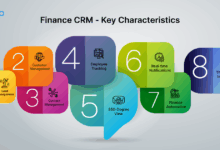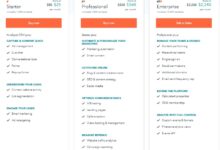Best Enterprise CRM Solutions: Enhancing Business Operations With Top Features
Best Enterprise CRM Solutions take center stage in revolutionizing how large businesses manage their customer relationships and operations. With a focus on scalability, customization, and data security, these solutions offer a competitive edge in today’s market.
Introduction to Enterprise CRM Solutions
Enterprise CRM solutions play a vital role in the success of large businesses by providing a centralized platform to manage customer interactions and relationships. These software systems are designed to streamline processes, enhance customer satisfaction, and drive revenue growth.
Key Features of Enterprise CRM Solutions
- Customer Data Management: Capture and store customer information in a centralized database for easy access and analysis.
- Lead Management: Track leads through the sales pipeline, assign tasks, and prioritize follow-ups.
- Marketing Automation: Create targeted campaigns, track performance, and analyze results to optimize marketing efforts.
- Customer Service Tools: Provide support through multiple channels, manage tickets, and track customer interactions for faster issue resolution.
- Integration Capabilities: Seamlessly integrate with other business systems to ensure data consistency and efficiency across departments.
Benefits of Implementing CRM Solutions in an Enterprise Setting
- Improved Customer Relationships: By centralizing customer data and interactions, businesses can personalize communication and provide better service.
- Enhanced Sales Performance: With lead management and sales forecasting tools, enterprises can increase sales efficiency and revenue.
- Increased Productivity: Automation of repetitive tasks and streamlined processes lead to higher productivity levels among employees.
- Data-driven Decision Making: Access to real-time analytics and reports allows businesses to make informed decisions based on customer insights.
- Scalability: Enterprise CRM solutions can grow with the business, adapting to changing needs and expanding operations seamlessly.
Top Features to Look for in Enterprise CRM Solutions
When selecting an Enterprise CRM solution, it is crucial to consider various features that can enhance your business operations and overall efficiency. Here are some key features to look out for:
Scalability
- Enterprise CRM solutions should be able to scale with your business as it grows, accommodating an increasing number of users and data.
- Scalability ensures that the CRM system remains effective and efficient even as your business expands.
Customization
- Ability to customize the CRM platform to meet the specific needs and workflows of your enterprise.
- Customization allows you to tailor the CRM solution to align with your unique business processes, improving user adoption and overall productivity.
Integration Capabilities
- Seamless integration with other business systems and applications, such as ERP software, marketing automation tools, and customer support platforms.
- Integration capabilities help streamline operations by centralizing data and facilitating cross-department collaboration.
Data Security Measures
- Robust security features to protect sensitive customer data and ensure compliance with data privacy regulations.
- Encryption, access controls, and regular security audits are essential for maintaining data integrity and safeguarding against cyber threats.
Pricing Structures
| CRM Platform | Price Range |
|---|---|
| Salesforce | $$$ – $$$$ |
| Microsoft Dynamics 365 | $$ – $$$ |
| Oracle CX | $$$ – $$$$ |
Role of AI and Machine Learning
- AI and machine learning capabilities in CRM systems can automate repetitive tasks, provide predictive analytics, and personalize customer interactions.
- These technologies optimize CRM processes by analyzing data patterns, identifying trends, and improving decision-making for enterprise-level companies.
Customization Options for Enterprise CRM Solutions
Customization plays a crucial role in the successful implementation of CRM solutions for large organizations. Tailoring the CRM system to meet the specific needs and workflows of a company can lead to improved efficiency, better customer relationships, and increased revenue.
Level of Customization Offered by Leading Enterprise CRM Providers
- Leading enterprise CRM providers such as Salesforce, Microsoft Dynamics 365, and Oracle offer a high level of customization options to their clients.
- These providers allow businesses to customize the CRM platform according to their industry, business processes, and unique requirements.
- Customization options typically include the ability to create custom fields, workflows, reports, and dashboards tailored to the organization’s specific needs.
Case Studies of Businesses Benefiting from Tailored CRM Solutions
-
Company A:
Company A, a manufacturing company, implemented a customized CRM solution that integrated with their existing ERP system. This customization allowed them to streamline their sales process, improve lead management, and provide better customer service.
-
Company B:
Company B, a financial services firm, utilized a tailored CRM solution to automate their client onboarding process and personalize their communication with customers. This customization resulted in increased client satisfaction and retention rates.
-
Company C:
Company C, a healthcare provider, implemented a customized CRM system that was specifically designed to meet HIPAA compliance regulations. This customization ensured the security of patient data while improving communication and coordination among healthcare professionals.
Integration Capabilities of Enterprise CRM Solutions
Seamless integration with other business systems is crucial for maximizing the efficiency and effectiveness of Enterprise CRM solutions. By connecting CRM software with other tools and platforms, businesses can streamline workflows, improve data accuracy, and enhance overall productivity.
Common Integrations Required by Enterprises
Enterprises often require integration between their CRM system and other key business applications such as ERP systems, marketing automation tools, e-commerce platforms, and customer support software. These integrations help in creating a unified view of customer data and enable seamless communication across different departments.
Challenges and Solutions in CRM Integration
- Challenge: Data inconsistency and duplication across systems.
Solution: Implement data mapping and synchronization processes to ensure data integrity. - Challenge: Compatibility issues between different software platforms.
Solution: Use middleware solutions or custom-built connectors to bridge the gap between systems. - Challenge: Ensuring secure data transfer and compliance with regulations.
Solution: Implement robust security protocols and encryption methods to protect data during integration.
Successful CRM Integrations for Improved Customer Experience
Companies like Airbnb, Amazon, and Spotify have successfully integrated their CRM systems with other applications to enhance customer experience. By leveraging CRM data insights, these companies have personalized marketing efforts, improved customer service interactions, and optimized their sales processes.
Role of APIs in CRM Integrations
Application Programming Interfaces (APIs) play a vital role in facilitating CRM integrations with third-party applications. APIs allow different software systems to communicate with each other, enabling seamless data exchange and automation of processes. By leveraging APIs, businesses can easily connect their CRM software with a wide range of tools and platforms.
Comparison of Integration Capabilities in Leading CRM Solutions
| CRM Solution | Integration Capabilities |
|---|---|
| Salesforce | Offers a wide range of pre-built integrations and a robust API for custom integrations. Known for seamless connections with various business applications. |
| Microsoft Dynamics | Provides out-of-the-box integrations with Microsoft products and third-party applications. Offers flexibility in customizing integrations based on business needs. |
| Oracle CRM | Offers a comprehensive suite of integration tools and supports seamless connectivity with Oracle’s extensive product portfolio. Known for its scalability and adaptability in large-scale operations. |
Data Security and Compliance in Enterprise CRM Solutions
In the realm of enterprise CRM solutions, data security and compliance are paramount to safeguarding sensitive information and ensuring adherence to industry regulations.
Security Measures in Enterprise CRM Solutions
Enterprise CRM solutions should incorporate robust security measures to protect data from unauthorized access, breaches, and cyber threats. Some key security features that should be in place include:
- Encryption of data at rest and in transit to prevent interception
- Role-based access control to limit user permissions based on their roles
- Regular security audits and vulnerability assessments to identify and mitigate risks
- Multi-factor authentication for an added layer of security
- Automatic logoff after periods of inactivity to prevent unauthorized access
Compliance Requirements for CRM Systems
CRM systems operating in highly regulated industries such as healthcare, finance, or legal sectors must comply with strict data protection regulations. Some compliance requirements that CRM systems must meet include:
- GDPR (General Data Protection Regulation) for handling personal data of EU citizens
- HIPAA (Health Insurance Portability and Accountability Act) for protecting healthcare information
- PCI DSS (Payment Card Industry Data Security Standard) for securing payment card data
- SOC 2 (Service Organization Control 2) for demonstrating effective controls over security, availability, processing integrity, confidentiality, and privacy of data
Examples of Security Breaches in CRM Systems
Security breaches in CRM systems can have severe consequences for businesses, leading to financial losses, reputational damage, and legal repercussions. Some notable examples of security breaches in CRM systems and their impact include:
-
The 2018 Salesforce data breach where a bug allowed users to access data they weren’t authorized to view, compromising the confidentiality of sensitive information.
-
The 2019 Capital One data breach where a hacker gained access to over 100 million customer records through a misconfigured firewall, resulting in a substantial financial and reputational damage for the company.
-
The 2020 Blackbaud data breach where a ransomware attack exposed the personal data of millions of individuals, highlighting the importance of robust security measures in CRM systems.
User Interface and User Experience (UI/UX) in Enterprise CRM Solutions
Intuitive UI/UX design plays a crucial role in the successful implementation of CRM software in large enterprises. A user-friendly interface can significantly enhance employee productivity and increase adoption rates within the organization.
Importance of Intuitive UI/UX Design
An intuitive UI/UX design is essential for CRM software in large enterprises as it ensures that users can easily navigate the system, access necessary information, and perform tasks efficiently. This leads to a better user experience, increased user satisfaction, and ultimately higher productivity levels.
Improving Employee Productivity and Adoption Rates
By providing a user-friendly interface, enterprise CRM solutions can streamline processes, reduce training time for employees, and encourage widespread adoption across different departments. This results in improved efficiency, collaboration, and overall business performance.
Best Practices for Designing CRM Interfaces
- Customize the interface to align with the specific needs and workflows of enterprise users.
- Simplify navigation and ensure easy access to key features and data.
- Implement responsive design for seamless access across various devices.
Significance of Customization Options in CRM UI/UX Design
Allowing users to customize the interface according to their preferences can enhance user satisfaction and promote better engagement with the CRM system. Customization options enable users to tailor the software to meet their individual requirements, leading to a more personalized user experience.
Examples of Successful CRM UI/UX Implementations
Companies like Salesforce, Microsoft Dynamics 365, and SAP have successfully implemented user-friendly interfaces in their enterprise CRM solutions. These implementations have resulted in increased user adoption, improved data accuracy, and enhanced decision-making processes, ultimately driving business growth.
Role of User Feedback in UI/UX Design Process
- Collecting user feedback is essential for identifying pain points, areas of improvement, and user preferences.
- Iteratively incorporating user feedback into the design process helps in continuously enhancing the UI/UX of enterprise CRM solutions.
- By listening to user input and making necessary adjustments, companies can ensure that their CRM software remains intuitive, efficient, and user-centric.
Reporting and Analytics Features in Enterprise CRM Solutions
Reporting and analytics tools play a crucial role in CRM solutions for enterprise decision-making. These features allow businesses to track, analyze, and visualize data to gain valuable insights into customer behavior, sales performance, and overall business operations.
Comparison of Reporting Capabilities
- Top CRM providers offer a range of reporting capabilities, including customizable dashboards, real-time data updates, and interactive visualizations.
- Some CRM systems provide pre-built reports for common metrics like sales pipeline analysis, lead conversion rates, and customer satisfaction scores.
- Advanced reporting features may include predictive analytics, machine learning algorithms, and forecasting tools for strategic decision-making.
Examples of Data-Driven Decision Making
- A company used CRM analytics to identify customer trends and preferences, leading to the development of targeted marketing campaigns that resulted in a 20% increase in sales.
- By analyzing sales data through CRM reports, a business was able to optimize its pricing strategy and increase profitability by 15% within a quarter.
Key Performance Indicators (KPIs) in CRM Reporting
- Sales metrics like conversion rate, average deal size, and sales growth.
- Customer service KPIs such as response time, resolution rate, and customer satisfaction scores.
- Marketing performance indicators like lead generation, campaign ROI, and customer acquisition cost.
Customized Reporting Setup Process
- Access the CRM system’s reporting module and select the data sources to be included in the report.
- Choose the metrics and dimensions to be analyzed, such as sales revenue by region or customer retention rates by product category.
- Apply filters and sorting options to refine the data, set up scheduling for automated reports, and share findings with relevant team members.
Data Visualization Importance
- Visual representations of CRM analytics, such as charts, graphs, and heat maps, help stakeholders quickly interpret data and identify trends.
- Interactive dashboards with drill-down capabilities allow users to explore data in more detail and make informed decisions based on real-time insights.
Case Study: Improving Customer Retention Rates
A telecommunications company utilized CRM reporting to analyze customer feedback and service interactions, identifying pain points and areas for improvement. By implementing targeted training programs and personalized customer outreach initiatives, the company saw a 30% increase in customer retention rates within a year.
Customer Support and Training for Enterprise CRM Solutions
Customer support and training programs play a crucial role in the successful adoption and utilization of enterprise CRM solutions. Robust support options and effective training modules are essential for maximizing CRM system efficiency and reducing downtime.
Importance of Customer Support and Training
Having reliable customer support and comprehensive training programs is key to ensuring that users across an organization can effectively utilize the CRM system. This support not only helps in resolving issues quickly but also promotes continuous learning and improvement.
Comparison of Support Options by Leading CRM Vendors
- Salesforce: Offers 24/7 support with various channels including phone, email, and chat support. Provides extensive online training resources and certifications.
- Microsoft Dynamics 365: Provides personalized support plans and training sessions. Offers a user-friendly help center with detailed guides and tutorials.
- Oracle CX: Offers dedicated customer success managers and on-site training programs for large organizations. Provides a knowledge base and community forums for self-help.
Strategies for Successful Adoption and Utilization
- Develop a detailed onboarding process for new users to familiarize them with the CRM system.
- Create role-specific training modules tailored to different user roles within the organization.
- Establish a feedback loop between customer support teams and CRM developers for continuous improvement and issue resolution.
Setting up a Feedback Loop
- Regularly collect feedback from customer support teams regarding common issues and user challenges.
- Analyze this feedback to identify areas for improvement in the CRM system.
- Collaborate with CRM developers to implement necessary enhancements and updates based on the feedback received.
Personalized Training Plans for Different User Roles
Providing tailored training plans based on user roles within an organization can significantly improve user adoption and utilization of the CRM system. Sales teams may require training on lead management and opportunity tracking, while customer service teams may need training on case management and customer interactions.
Evaluation Checklist for Customer Support Services
- Response time for support tickets and inquiries.
- Availability of support channels such as phone, email, and chat.
- Quality of training resources and documentation provided.
- User satisfaction ratings and feedback on support services.
Mobile Accessibility and Remote Work Features in Enterprise CRM Solutions
Mobile accessibility and remote work capabilities have become essential in today’s business landscape, especially for distributed teams. With the rise of remote work and the need for on-the-go access, enterprise CRM solutions must offer robust mobile features to ensure seamless collaboration and productivity.
Importance of Mobile Accessibility in CRM Solutions
- Mobile accessibility allows team members to access CRM data anytime, anywhere, increasing flexibility and responsiveness.
- With mobile CRM features, sales representatives can update information on the go, leading to faster decision-making and improved customer interactions.
- Remote work capabilities enable distributed teams to stay connected and work efficiently, regardless of physical location.
Comparison of Mobile Accessibility Options in Leading CRM Solutions
| CRM Solution | Mobile Features |
|---|---|
| Salesforce | Mobile app with real-time data sync, offline access, and customizable dashboards. |
| Microsoft Dynamics 365 | Mobile app with AI-driven insights, task management, and integration with Office 365. |
| HubSpot | Mobile app with contact management, deal tracking, and email tracking capabilities. |
Setting Up and Utilizing Remote Work Features in CRM Systems
- Ensure all team members have access to the CRM platform on their devices and are trained on remote work functionalities.
- Create remote work protocols and guidelines for using CRM tools effectively while working outside the office.
- Utilize collaboration features such as shared calendars, task assignments, and communication tools within the CRM system.
Case Study: Enhancing Productivity with Mobile CRM Features
By implementing mobile CRM features, XYZ Company saw a 20% increase in sales productivity among field sales representatives, who could now access customer data and update records in real-time.
Best Practices for Leveraging Remote Work Functionalities in CRM Systems
- Regularly communicate with team members through CRM channels to maintain alignment and visibility.
- Use automated workflows and notifications to streamline remote work processes and ensure timely follow-ups.
- Encourage feedback from team members on the effectiveness of remote work features and make adjustments as needed.
User Survey on Mobile CRM Features for Remote Work Scenarios
- Conduct a user survey to gather insights on the usability and impact of mobile CRM features on remote work efficiency.
- Analyze feedback to identify areas for improvement and optimize the remote work functionalities of the CRM system.
- Implement changes based on user feedback to enhance the overall remote work experience for the team.
Pricing Models for Enterprise CRM Solutions
When it comes to enterprise CRM solutions, pricing models can vary significantly based on the provider, features included, and the size of the organization. Understanding the different pricing structures and costs associated with implementing and maintaining CRM solutions is crucial for making an informed decision for your business.
Types of Pricing Models
- Subscription-Based: Many CRM providers offer subscription-based pricing models, where organizations pay a monthly or annual fee per user. This model often includes updates, support, and maintenance.
- Perpetual License: Some providers offer a one-time licensing fee for their CRM software, along with additional costs for updates and support services.
- Usage-Based: In this model, organizations pay based on the number of users or the level of usage of the CRM system. This can be advantageous for businesses with fluctuating user numbers.
Cost Considerations
- Implementation Costs: Initial setup, customization, and data migration can incur additional costs that should be factored into the overall budget.
- Training and Support: Ongoing training for users and access to technical support may come at an extra cost depending on the provider.
- Integration Expenses: Integrating the CRM solution with other business systems or third-party applications can add to the total cost of ownership.
Factors Influencing Pricing Decisions
- Scalability: Organizations need to consider how pricing scales with the growth of their business and the addition of new users.
- Feature Set: The more advanced features and functionalities a CRM solution offers, the higher the price may be.
- Vendor Reputation: Established CRM providers with a strong track record may charge higher prices compared to newer entrants in the market.
Case Studies of Successful Implementations of Enterprise CRM Solutions
Implementing CRM solutions at an enterprise level can lead to significant improvements in customer relationships, sales processes, and overall business performance. Let’s explore some real-world examples of successful CRM deployments in large organizations.
Company A: Enhancing Customer Engagement
- Company A implemented a cloud-based CRM platform to centralize customer data and streamline communication across departments.
- As a result, customer service response times improved by 30%, leading to a 15% increase in customer satisfaction rates.
- The CRM system also enabled personalized marketing campaigns, resulting in a 20% boost in sales conversion rates.
Company B: Optimizing Sales Processes
- Company B integrated AI and machine learning capabilities into their CRM system to analyze customer behavior and predict purchasing patterns.
- This approach led to a 25% increase in cross-selling opportunities and a 10% growth in overall sales revenue.
- By leveraging real-time analytics and insights from the CRM platform, Company B achieved a 20% reduction in sales cycle duration.
Challenges Faced and Key Strategies
- Common challenges during CRM implementation included data migration issues, user adoption resistance, and integration complexities with existing systems.
- Successful companies addressed these challenges by providing comprehensive training programs, establishing clear communication channels, and involving key stakeholders in the decision-making process.
- By aligning CRM initiatives with strategic business goals, organizations were able to achieve better customer retention rates, increased sales productivity, and improved operational efficiency.
Cloud-Based CRM vs. On-Premise Systems
- Cloud-based CRM platforms offer scalability, flexibility, and lower upfront costs compared to on-premise systems.
- On the other hand, on-premise solutions provide greater control over data security and customization but require higher maintenance and infrastructure investments.
- Companies need to evaluate their specific needs and budget constraints to choose the most suitable CRM deployment option.
Integration of AI and Machine Learning
- AI and machine learning technologies are revolutionizing CRM systems by providing predictive analytics, automated workflows, and personalized customer experiences.
- By leveraging AI-driven insights, companies can anticipate customer needs, automate routine tasks, and deliver targeted marketing campaigns with higher success rates.
- The integration of AI into CRM solutions is becoming increasingly essential for staying competitive in today’s digital landscape.
Recommendations for CRM Adoption
- Prioritize user training and change management to ensure successful CRM implementation and adoption across all departments.
- Define clear objectives and KPIs to measure the impact of CRM solutions on key business metrics such as customer retention, sales growth, and operational efficiency.
- Regularly review and optimize CRM processes to align with evolving customer demands and industry trends, leveraging new technologies for continuous improvement.
Industry-Specific Considerations for Enterprise CRM Solutions
In today’s diverse business landscape, different industries have unique requirements when it comes to CRM solutions. Understanding these industry-specific considerations is essential for companies looking to implement enterprise CRM solutions successfully.
Retail Industry
- Personalized Customer Interactions: Retail businesses often require CRM solutions that enable personalized customer interactions to drive sales and enhance customer loyalty.
- Inventory Management Integration: CRM systems in retail need to seamlessly integrate with inventory management systems to ensure accurate product availability data.
- Omnichannel Support: Retailers benefit from CRM solutions that support omnichannel interactions, allowing customers to engage across various platforms seamlessly.
Healthcare Sector
- Patient Data Security: CRM solutions for healthcare must prioritize data security and compliance with stringent regulations to protect sensitive patient information.
- Integration with Electronic Health Records (EHR): Seamless integration with EHR systems is crucial for healthcare CRM solutions to provide a comprehensive view of patient data.
- Appointment Scheduling and Reminders: Healthcare CRM systems should include features for appointment scheduling and automated reminders to improve patient engagement.
Financial Services Industry
- Regulatory Compliance: CRM solutions in finance must adhere to strict regulatory requirements to ensure data privacy and security for sensitive financial information.
- Lead Management for Sales: CRM systems tailored for financial services need robust lead management capabilities to track and convert leads effectively.
- Integration with Banking Systems: Seamless integration with banking systems is essential for financial CRM solutions to provide real-time financial data to users.
Scalability and Future-Proofing with Enterprise CRM Solutions
In today’s fast-paced business environment, scalability and future-proofing are essential considerations when selecting CRM solutions for enterprise growth.
Adapting to Evolving Business Needs
One of the key advantages of scalable CRM platforms is their ability to adapt to evolving business needs and expansions. As a company grows, its customer base, data volume, and workflows also expand. A scalable CRM solution can accommodate these changes by adding new functionalities, increasing storage capacity, and enhancing performance without disrupting day-to-day operations.
- Scalable CRM systems allow for seamless integration with other business applications, enabling companies to streamline processes and improve overall efficiency.
- By providing customization options and flexible configurations, scalable CRM platforms empower organizations to tailor the system to their specific requirements, ensuring long-term relevance and usability.
- Regular updates and enhancements offered by CRM providers ensure that the system remains up-to-date with industry trends and technological advancements, enhancing its longevity and effectiveness.
Strategies for Long-Term Relevance
To ensure that CRM systems remain relevant and effective in the long term, companies can implement the following strategies:
- Regularly assess and reassess business goals and objectives to align CRM usage with evolving needs.
- Provide continuous training and support for employees to maximize CRM utilization and efficiency.
- Engage in ongoing communication with CRM vendors to stay informed about updates, new features, and best practices.
- Monitor key performance indicators (KPIs) and analytics to track CRM performance and identify areas for improvement or optimization.
Integration of AI and Automation in Enterprise CRM Solutions
AI and automation are revolutionizing the way large enterprises manage customer relationships through CRM solutions. By leveraging artificial intelligence and automation, CRM systems can enhance efficiency, personalize customer interactions, and drive business growth.
AI-Driven Features in Modern CRM Systems
- AI-powered predictive analytics to forecast customer behavior and trends.
- Automated lead scoring to prioritize sales opportunities based on data analysis.
- Natural language processing for sentiment analysis and personalized communication.
- Chatbots for instant customer support and engagement.
Revolutionizing CRM Functionality with AI Integration
- AI algorithms can analyze vast amounts of data to provide actionable insights for better decision-making.
- Automation of routine tasks frees up time for employees to focus on high-value activities.
- Personalization of customer interactions based on AI-driven recommendations leads to increased customer satisfaction and loyalty.
Emerging Trends and Innovations in Enterprise CRM Solutions
The landscape of enterprise CRM solutions is constantly evolving with emerging trends and innovations that are reshaping the way large businesses manage customer relationships. Let’s explore some of the latest developments in this field:
AI-driven CRM Systems
AI-driven CRM systems are revolutionizing customer relationship management for large corporations by leveraging artificial intelligence to analyze data, automate tasks, and personalize customer interactions. Successful implementations of AI-driven CRM systems have led to improved efficiency, enhanced customer satisfaction, and increased sales performance.
Data Analytics for CRM
Data analytics plays a crucial role in enhancing customer relationship management within enterprises by providing valuable insights into customer behavior, preferences, and trends. By leveraging data analytics tools, businesses can make informed decisions, personalize marketing campaigns, and optimize customer experiences to drive growth and loyalty.
Cloud-based CRM vs. On-premise Systems
Cloud-based CRM solutions offer scalability, flexibility, and cost-effectiveness compared to traditional on-premise systems. With cloud-based CRM, businesses can easily scale their operations, access real-time data from anywhere, and reduce infrastructure costs. On the other hand, on-premise systems provide greater control over data security and customization but may lack the agility and scalability of cloud solutions.
Personalized Customer Experiences
Personalized customer experiences have become a cornerstone of modern CRM strategies, allowing businesses to tailor interactions based on individual preferences and behavior. By personalizing communication, product recommendations, and support services, enterprises can build stronger relationships with customers, drive loyalty, and differentiate themselves in a competitive market.
Social Media Integration in CRM
Social media integration has transformed CRM practices and customer engagement for enterprise-level businesses by providing valuable insights, facilitating communication, and enabling targeted marketing campaigns. By integrating social media data into CRM systems, companies can better understand customer sentiment, engage with audiences in real-time, and drive brand awareness and advocacy.
Challenges in CRM System Migration
Transitioning to a new CRM system can pose challenges for companies, including data migration issues, user adoption concerns, and organizational resistance to change. To ensure a smooth migration process, businesses should develop a comprehensive migration plan, provide adequate training and support to users, and align CRM implementation with business goals and objectives.
Closure
In conclusion, Best Enterprise CRM Solutions offer a comprehensive approach to streamline business processes, enhance customer interactions, and drive growth. By incorporating advanced features and ensuring data security, these solutions pave the way for sustained success in the digital age.




